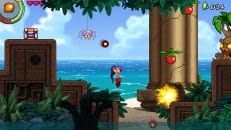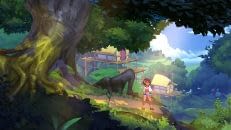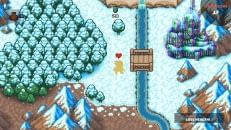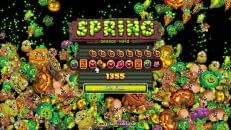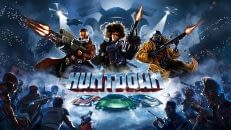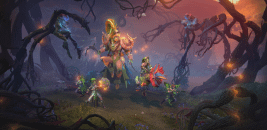Interview With Soldak Entertainment
Steven Peeler is a brave man. After being the Technical director for Ritual Entertainment for a number of years, he took the risk and decided to start up his own studio. Soldak Entertainment was born in 2004 with Steven acting as the sole designer and programmer, with his wife Delilah providing the stories. Since then, Steven has become a well-respected indie developer, best known for his innovative action-RPGs. He has built a strong community of fans for Soldak’s previous games, Depths of Peril and Kivi’s Underworld. His latest project is his most ambitious; a dynamically generated action RPG called Din’s Curse.
Steven is currently hard at work with updates and expansions for Din’s Curse. Much to our delight, he managed to find some time in his busy schedule to answer our questions.
IGM: First things first, what makes Din’s Curse so unique in comparison to other action-RPG’s?
SP: Din’s Curse is unique in a lot of ways actually. First off the world is very dynamic. The world responds to what is going on. Monsters can get into fights and even go to war with one another. If Tuzan the Lich threatens to attack the town, sooner or later he will unless you kill him first. When he does, you better be quick because NPCs can die. A darkness machine could cause Janos to go broke trying to pay for suddenly really expensive food. Janos might sell town secrets to the Torvas so he can afford to eat. All of these and much more can happen based on what you, the monsters, and the NPCs all decide to do.
Another unique feature is the fantastic amount of randomness that adds a huge amount of replayability. Every world is different. Here’s just some of the things that are random and different in each new world: town and dungeon layout, NPCs, monsters, objects, traps, quests, items, and even major world modifiers.
Another important difference is that you can interact with the world quite a bit. If a locked door is in the way, you can break it down. If the floor is covered with oil, it can be lit on fire. Be careful around energy vortexes and gas leaks because they are very explosive. Breaking support beams tends to cause cave-ins. In the expansion, you can even suck up an oil spill into an empty vial to use as a weapon powerup.
IGM: You have recently released the Demon War expansion for Din’s Curse. What have you added to the game with this expansion? Were there any difficulties you faced in development?
SP: We have expanded on pretty much all of the things that makes Din’s Curse unique: more dynamic quests that impact the world like anti-magic machines, new world modifiers like Drunk Town, more items like ego weapons that can gain levels, a new Demon Hunter class, more monsters, and much more.
The biggest change though is that the NPCs in town are now much more dynamic just like the rest of the world. They have limited money, care about their happiness, and have relationships with others. The NPCs can do all sorts of things from stealing money from another NPC because they are in debt to giving gifts to the player because they are happy to getting in fights in town because they hate another NPC.
I think the biggest difficulty in creating our games is testing and balancing because there are so many different ways everything can interact.
IGM: How much have you catered this expansion according to community feedback, and how important is the community in shaping your games?
SP: We greatly value the input from our community. That sounds like a PR line, but we really do listen to feedback from our gamers. One of the main reasons why we do pre-orders with access to the beta is so that we can get feedback from our actual gamers. For Din’s Curse: Demon War, we’ve been in beta for around a month and a half. During this time we have made over 500 changes, many of these based on suggestions from the community. We even try to recognize who gave us the suggestion in our patch change list.
IGM: Do you plan on continuing to work on Din’s Curse for much longer, or do you have other ideas in your head that justify working on another project? You previously showed interest in a turn-based game for instance.
SP: I have no idea. I pretty much always have ideas for other games that I think would be really fun to work on.
IGM: Do you want to expand your games to more platforms, such as Xbox Live and mobile apps for instance, or are you more suited to PC and Mac only?
SP: In general yes I would love to be on more platforms. I could see our games on both consoles and mobiles. Our biggest issue would be getting the interface right since they are very different on PCs, consoles, and mobiles.
IGM: How important do you think it is as an indie developer and in particular a programmer, to (in the words of Tommy Refenes) “complain a lot”?
SP: Complain? I wouldn’t really say it’s important at all. I try to let my work speak for itself. Although considering how popular Super Meat Boy is, maybe I have that wrong.
IGM: Do you think there will be any more space within the action-RPG genre after the release of Diablo III this year?
SP: That’s a good question. I would guess that AAA game companies that are making action RPGs will steer around Diablo’s release schedule because it’s hard to have two similar blockbusters at one time. I don’t think that rule necessarily applies to indies though. A good indie game might actually make more money going up against something like Diablo because they might get a lot more attention than they would have otherwise. Of course notice there were a lot of “mights” in that sentence.
IGM: What role do you see indie developers occupying within the games industry at the moment?
SP: Right now I would say the role of indie developers is to inject some innovation into the industry. AAA games are already risky because they cost so much to make that it is hard to justify risking more by going too far off of the beaten path. So indies bring the innovation and AAA games bring it to the mass market.
IGM: If you had all the means necessary to make any game you wanted, what would it be, and what would you hope to achieve?
SP: I would probably work on the same games. I’m not even sure we would change much. I’m sure we would invest a little more into production values, but like I said before once you invest too much money into something it is harder to risk trying something different. Innovation is something I value pretty highly.
IGM: With your wealth of knowledge, what advice would you give to upcoming indie developers?
SP: Pick an idea that you are passionate about, talk about your game as often as you can to pretty much everyone, and most important, actually finish it.
Make sure to visit Steven’s website at soldak.com for all the latest news regarding his fantastic action-RPGs. For those who would like to try out the demo’s for his games for free, simply go here.

